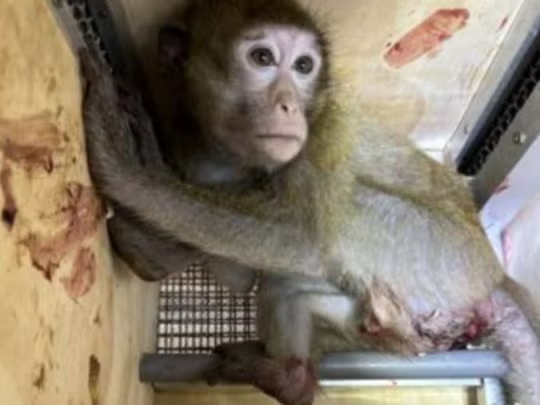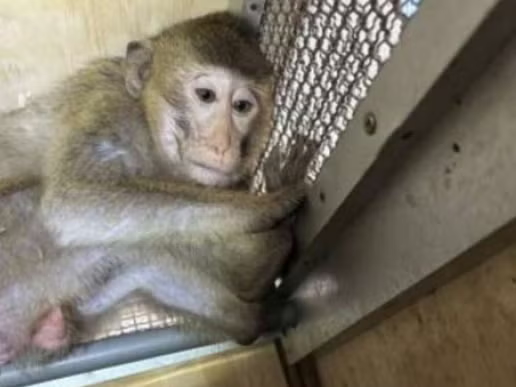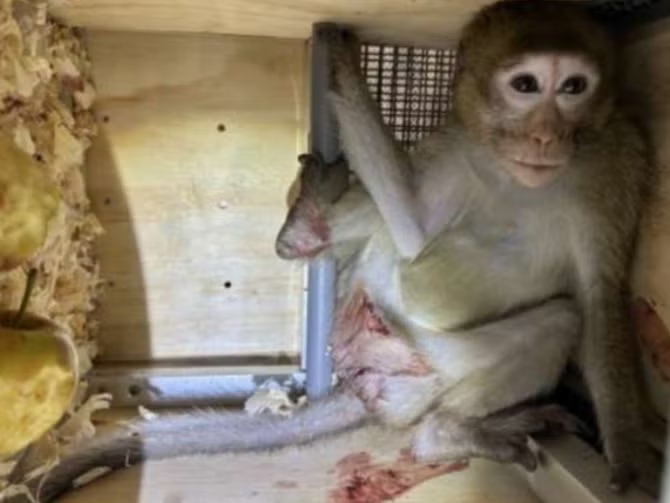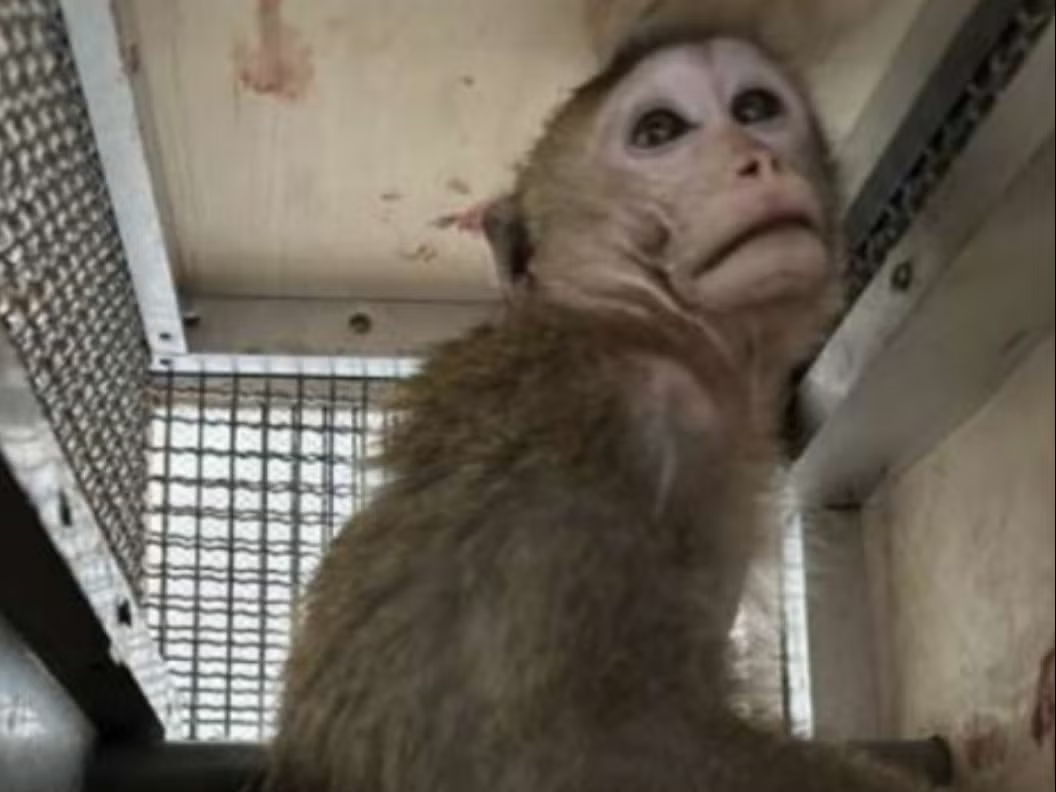The transportation of monkeys for laboratory testing is a practice that has sparked significant ethical concerns in recent years, and a recent incident involving long-tailed macaques highlights the disturbing realities of this industry.
Monkeys that were flown from Mauritius and Vietnam to the UK for toxicology testing were discovered to be badly injured and terrified, with their crates smeared with blood.
The animals’ journeys, which lasted up to 25 hours, were a brutal reminder of the ongoing struggles these primates face as they are used in research.
The Horrifying Conditions of Monkey Transport
The plight of the long-tailed macaques in this particular case is a stark representation of the cruelty often associated with transporting primates for laboratory testing.
These monkeys were confined to small wooden crates for journeys lasting up to 25 hours, first traveling from Mauritius and Vietnam to the Netherlands, and then being transported via road and air to Manchester, UK. The crates were reportedly so small that the monkeys could not stand upright, which likely caused immense stress and discomfort.
Photographs released through Freedom of Information (FOI) requests show the blood-soaked crates, giving a glimpse into the traumatic experiences of the monkeys during their transit. Some of the macaques were so badly injured that their crates were stained with blood, revealing the violent and distressing conditions they endured.
Read : Common Diabetes Drug Metformin Slows Aging in Monkeys
For example, one macaque was discovered with a severe anal prolapse, a potentially fatal condition. Despite this, the animals were still deemed fit for transport, raising serious concerns about the adequacy of the welfare assessments conducted by the authorities involved.
Read : Exploring Fanjingshan: China’s Sacred Mountain Sanctuary, Known as Stairways to Heaven
The situation was made even worse by the flight conditions. In one case, 80 macaques were flown in an aircraft hold where temperatures were as low as 10°C, which could have exacerbated their suffering.

The monkeys endured cold, cramped, and overcrowded conditions, while loud noises and vibrations from the plane likely added to their stress. These factors compounded the already traumatic experience of being transported over long distances without adequate space or comfort.
The Ethical Dilemmas of Animal Testing and Transport
The transportation of monkeys for lab tests is not an isolated incident, but rather part of a broader practice in which animals are subjected to inhumane conditions in the name of scientific progress. Long-tailed macaques are commonly used in toxicology testing, where they are exposed to drugs, chemicals, and other substances to assess their toxicity.
These tests, which are often conducted by pharmaceutical companies and research institutions, involve restraining the monkeys and administering substances either orally, through injection, or by inhalation. Many of these tests are done without anesthesia, and side effects can include vomiting, convulsions, internal bleeding, and even death.
While proponents of animal testing argue that such procedures are essential for developing new medical treatments and vaccines, the ethical concerns surrounding the treatment of these animals cannot be ignored.
The use of monkeys, in particular, is controversial due to their high cognitive abilities and the suffering they endure in laboratory settings. For instance, the conditions these macaques face—such as confinement, forced immobilization, and exposure to harmful substances—are in direct contrast to the principles of humane treatment of animals.

The importation of these monkeys from countries like Mauritius and Vietnam is often preferred over breeding them locally in the UK, as it is quicker and less expensive. However, this comes at a significant cost to the well-being of the animals. Once in the UK, the monkeys are subjected to further testing, which can cause long-term psychological and physical harm.
Opponents of animal testing argue that alternative methods, such as computer simulations, cell cultures, and non-animal-based testing, can provide more accurate results without causing unnecessary harm to sentient beings.
They contend that the suffering experienced by the monkeys in these experiments is not justifiable, especially when alternative research methods are available. The ongoing use of primates in testing raises significant ethical questions about the value placed on animal life and whether the ends truly justify the means.
Calls for Change: A Growing Movement Against Animal Testing
The revelation of the injuries and distress suffered by the macaques during their transport has reignited calls for change from animal rights groups and the general public. Activists from organizations such as Action for Primates and Animal Rights have been vocal in condemning the practice of shipping monkeys for laboratory testing.
These groups argue that the transport and testing of primates involve unnecessary cruelty and that scientific advancements should not come at the expense of animal welfare.
In addition to the injuries sustained during transportation, concerns have also been raised about the broader ethical implications of using animals for laboratory testing.

Some animal welfare organizations assert that the continued reliance on primates in research reflects an outdated and inhumane approach to scientific inquiry. There are calls for the UK government to put an end to the importation of monkeys for testing and for research institutions to explore more ethical alternatives.
For example, Sarah Kite, co-founder of Action for Primates, emphasized the emotional toll that such transport and confinement take on the monkeys. “When primates are shipped as cargo, they are forced to spend many hours confined to small, single shipping crates and may experience poor ventilation, unfamiliar and loud noise, temperature fluctuations, and delays along the way,” she stated. This not only causes physical harm but also severe psychological distress, which can have lasting effects on the animals’ well-being.
The UK government and research institutions, however, defend the practice by highlighting the benefits of animal testing in the development of medical treatments and vaccines. They argue that animal testing has contributed to advances in the treatment of diseases such as cancer, diabetes, and the development of human vaccines.
Understanding Animal Research, a group that supports the continuation of animal testing, contends that it is necessary for public health and the advancement of medical science.
Despite these justifications, the public perception of animal testing is shifting, with increasing awareness of the conditions animals face in laboratories.

Many are calling for more transparency in the practices of research institutions and for stricter regulations to ensure the humane treatment of animals. Animal rights activists are pushing for a future where alternatives to animal testing are the norm, and primates no longer have to endure such traumatic experiences.
The transportation and use of monkeys in laboratory testing raises critical ethical questions that need to be addressed. The disturbing images of macaques being transported in blood-soaked crates highlight the severe mistreatment of animals in the name of science. While animal testing has historically played a role in medical advancements, the growing movement to find alternative methods for testing must be taken seriously.
The transport conditions and the suffering of the monkeys involved in this particular case serve as a powerful reminder of the need for reform in how animals are treated in research.
Governments, research institutions, and the public must come together to support the development and implementation of alternative testing methods that do not rely on the suffering of sentient beings. Until then, the question remains: Is the sacrifice of these animals truly worth the cost?

